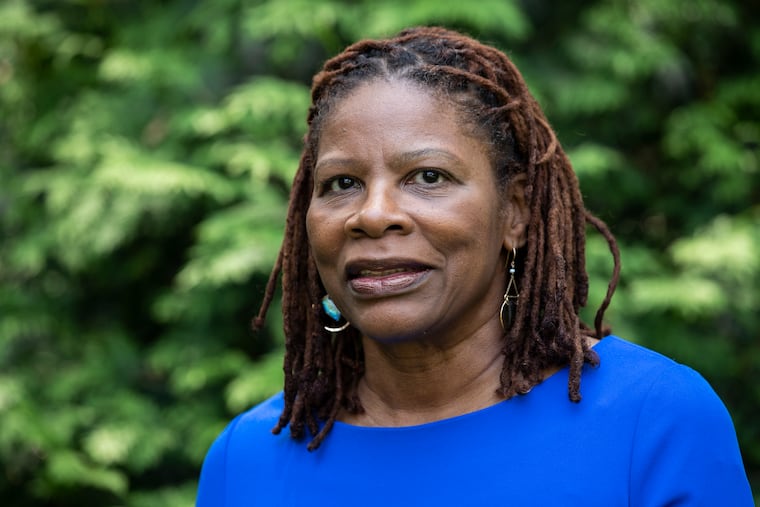Long known as a ‘white man’s disease’, the first step to better Parkinson’s disease care in the Black community is to increase awareness
“Being a Black woman, I was raised to never crack. You stand up and deliver,” said Shirley Grass, who was diagnosed with Parkinson’s in 2020

Shirley Grass ate well, worked out regularly and never had any major health problems. So when she started noticing new aches and pains, she assumed her symptoms were a sign of aging.
Then the shooting pains along the left side of her body lasted longer. Friends commented that she was “walking funny.”
“I was achy in my upper body, stiff and rigid. Sometimes in constant pain. I didn’t know what it was,” Grass recalled.
An appointment with her longtime primary physician led to a neurology consult, which led to a DaTscan, an imaging test like an MRI, but focused on the function instead of the structure of the brain.
Then came her diagnosis: Parkinson’s disease.
“It was absolutely scary,” said Grass.
What is Parkinson’s disease?
Parkinson’s disease is a neurodegenerative disorder of the central nervous system which has telltale signs of tremors, muscular rigidity, and shuffling movements. Former Mayor Edward G. Rendell announced in 2018 that he was living with Parkinson’s disease, along with one million other Americans.
» READ MORE: Penn, Drexel get $22 million to study Parkinson’s, Alzheimer’s, other dementias
“I was stunned because I’d always viewed myself as indestructible,” Rendell said at the time.
There is neither a clear understanding of the cause, nor a cure. However, early detection can help with managing the symptoms and providing a higher quality of life.
But many African Americans are diagnosed much later when their constellation of symptoms are more pronounced. “Studies show that people of color who have symptoms of Parkinson’s disease go to see a specialist later when their symptoms are more progressed,” said Andrew Siderowf, director at Penn’s Parkinson’s Disease and Movement Disorders Center.
“They may not seek immediate medical attention because they may not consider milder symptoms a priority, and there is a historical lack of trust in [medical] institutions.”
“The white man’s disease”
Rendell is also the traditional face of Parkinson’s disease.
Nakisha Powell-Jones remembers when Parkinson’s disease was nicknamed the “old white man” disease and thought to be a rare occurrence in Black people. “They used to call it that, even when I was in nursing school,” Powell-Jones said.
But Ruth Powell, Powell-Jones’s grandmother, was neither a man, white, nor very old when she was first diagnosed with Parkinson’s disease.
Powell-Jones said her grandmother was a nurse at the former Osteopathic Hospital. She was also the nurse for her North Philadelphia community. Everyone came to her for advice or for medical attention. “I remember my grandmother stitching someone up in our kitchen,” Powell-Jones recalled.
But when Powell lost her footing and fell with a patient, a physician suggested she see a neurologist. That visit led to her diagnosis of Parkinson’s.
Powell-Jones remembered she was only 16 when her grandmother sat the family down and told them that things were going to get much worse for her.
“My grandmother was my superhero,” Powell-Jones said. “I thought she was immortal. I wish we knew more and could have done more.”
Increasing awareness of Parkinson’s
There is controversy in the research community over whether African Americans have a lower prevalence of Parkinson’s disease or if the Black community is severely underdiagnosed. Powell-Jones, who is a psychiatric nurse manager in Delaware, thinks it is the latter.
“Whenever I go to the supermarket, I see people who I can tell have Parkinson’s. But do they know?” Powell-Jones said.
“People of color tend to think that grandmom is just slow, just aging,” said Wendy R. Lewis, CEO of The Parkinson Council, a Delaware Valley nonprofit health advocacy organization for the improvement of the quality of life for people with Parkinson’s, their caregivers, and families.
“I was achy in my upper body, stiff and rigid.”
Lewis is working to boost awareness and understanding of the disease within the African American community but also among medical professionals. For many in the Black community, Muhammad Ali, who died in 2016 after a 34-year bout with the disease, and Jesse Jackson Sr., who was diagnosed in 2017, have been the face of Black Parkinson’s disease.
“I knew after George Floyd we needed to do more,” Lewis said. “We aren’t doing enough now to create more access to high quality Parkinson’s care. If you see that the city is 42% African American and only 8% of your patients are African American, there is a disconnect.”
The need for support
Grass, who retired from her work as an organization development consultant last year, hid her diagnoses from her to coworkers out of fear they would see the physical symptoms and question her competence.
“Being a Black woman, I was raised to never crack. You stand up and deliver. And I was very good at that,” said Grass.
But she is now ready to go public and has just joined the board of directors of The Parkinson Council to help spread the word within the African American community. She has also joined a research study to help scientists gather diversified information about the disease. “This is something I would never have done before my diagnosis,” Grass said.
We aren’t doing enough now to create more access to high quality Parkinson’s care.”
She also wants to bring more culturally supportive resources to Black patients learning to live with the chronic, debilitating disease.
Powell-Jones said her grandmother went from being a vibrant outgoing woman to a virtual recluse, isolated by the disease and unable to find a support group where she felt understood.
“It’s not going to go away if we ignore it,” said Grass. “It’s not.”